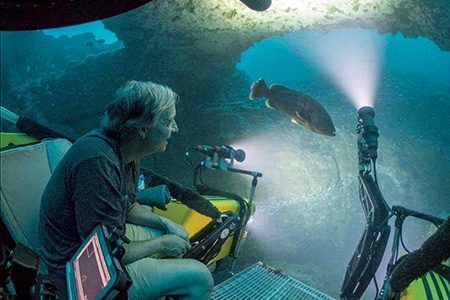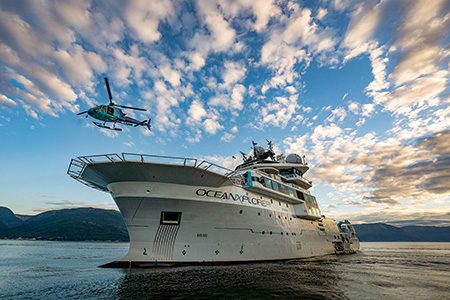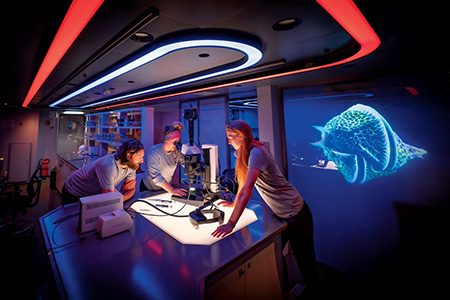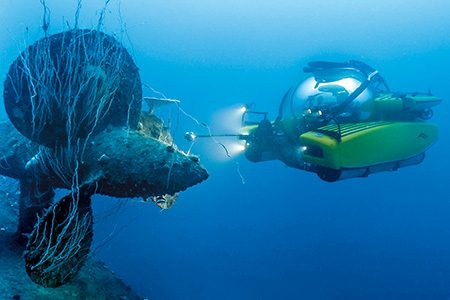Hometown: Greenwich, Connecticut
Age: 75
Years Diving: 55
Why I’m a DAN Member: I feel a kinship with other DAN members and want to share in our collective goals for communication and ocean conservation.
You don’t have to dive very deep into the world of finance to be aware of Ray Dalio. Journalist Bill Whitaker interviewed him in 2019 on the campus of Dalio’s firm, Bridgewater Associates, and introduced him this way: “This week on 60 Minutes we met Ray Dalio. He runs the most successful hedge fund in the world, and he is one of the wealthiest men in the United States.”
Submerged beneath the blue Caribbean in Dalio’s research submarine, they continued their chat. “Whether it is investing or exploration, Dalio goes his own way,” Whitaker said. “While your fellow billionaires — Bezos, Branson, Elon Musk — are all going into outer space — they’re headed toward Mars and the moon — you choose to go down. Why is that?”
“I find ocean exploration a lot more exciting, a lot more important than space exploration, right? And then you think about it affects our lives so much more,” Dalio replied.
“I don’t understand the resource allocation of space to the ocean, really, in terms of return on investment,” Dalio continued. “The return on investment down here is fabulous.”


How he came to that epiphany is not much different from most DAN members of a certain age. “My fork in the road was watching Jacques Cousteau on TV — well that and Sea Hunt. I did both,” Dalio recalled, attributing his love for the ocean to those early television programs. He got scuba certified in 1970, but the day he took his kids diving for the first time set the hook. He knew then that the ocean would be integral to his life.
Dalio eventually acquired enough money to make his nascent dream of supporting ocean research begin to take form. The Alucia, a 184-foot (56-meter) research vessel, became the platform to support his vision of marine science, and he would get to tag along as his time allowed.
About the same time, Dalio’s son Mark worked at National Geographic. It was his first job out of college, and a synergy was beginning to form. James Cameron, a National Geographic Explorer at Large, had been involved with Alucia. Cameron’s media experience is legendary as director of Titanic and the Avatar films, and his bona fides as a deep ocean expert includes 33 dives to the Titanic and the former world solo deep dive record of 35,787 feet (10,908 m) to Challenger Deep in the Deepsea Challenger submersible.
Meanwhile, Alucia supported production as well, including the 2012 Discovery Channel and NHK collaboration that documented giant squid through 55 submersible dives with bioluminescent lures and lights with wavelengths invisible to the animals. These dives sometimes reached depths greater than 3,000 feet (914 m). Alucia also supported Blue Planet II; with that series’ success, Dalio had a glimpse of what an audience of half a billion viewers could mean for ocean conservation.
After 11 years, Dalio and Mark were ready to commission a new ship, the OceanXplorer, with four times the capacity of Alucia. The ship’s statistics are impressive: 286 feet (87.1 m) long, a maximum crew of 72, four wet and dry labs for tasks such as genetic sequencing and microscopy, media facilities including digital imaging capture and editing, and a recompression chamber. It’s the most advanced scientific research, exploration, and media production vessel ever built. Cameron and production designer C. Page Buckner consulted on the Hollywood-quality production facilities.


OceanXplorer carries a resident H125 Airbus helicopter, Zodiac Milpro MK6 HD inflatable boats, two crewed Triton submersibles capable of 3,280-foot (1,000-m) dives, and one large remotely operated vehicle (ROV) depth rated to 19,685 feet (6,000 m) along with a mini ROV that can operate in tandem with the main ROV. The sonar array can map at depths up to 26,247 feet (8,000 m).
Dalio’s acquisition of the ship, a former oil field support vessel, was timely because the oil market had crashed, and the ship was only 5 years old. It had to be stripped and rebuilt at enormous expense to meet Dalio’s demanding vision. The Woods Hole Oceanographic Institution gave insight into their wish list for ocean research, and Cameron advised on the lighting and design that give the vessel its ambiance consistent with a vision for a starship USS Enterprise of the sea. They would go where no one had gone before in style and functionality that had never been seen before.
OceanX, the nonprofit organization that Dalio co-founded and continues to advise, supports the ship’s expeditions, began to take on relatively short projects in places such as Norway and the Azores and others that might last multiple months at sea. Most recently they were in Indonesia, documenting what may be the world’s greatest and least discovered biodiversity. Discovery is a task for which the ship is uniquely capable.
Dalio requires “three thumbs up” to greenlight an OceanX project: excellent science, great media potential, and cost justification. He explains the cost justification as, “I’ve allocated a certain amount of money I’m willing to lose each year philanthropically, and then we seek symbiotic relationships.”
Currently, the most high-profile and symbiotic relationship is a six-part cable network and streaming series, OceanXplorers, that premiered Aug. 18, 2024, on the National Geographic channel. All episodes stream the day after release on Disney+ and Hulu. Cameron served as executive director and narrator.
If there were an awards category for Outstanding Production Design in a Science Series, OceanXplorer would clearly be in contention. The work Dalio and OceanX do is significant enough to warrant an award to honor them.
Explore More
Watch the 60 Minutes interview with Ray Dalio in the link below.
© Alert Diver – Q3 2024